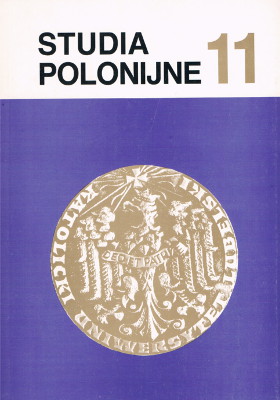Nation in Sociological Analyses
Main Article Content
Abstract
The author deals with the idea of nation as a category in scientific thinking concerned with the social reality. Only strictly sociological issues are discussed here. First, the category is analysed as present in the Grand Tradition of the world sociology of the 19th and 20th centuries; second, as present, to a greater degree, in the Grand Tradition of Polish sociologists.
In the introductory part the author outlines the basic idea of the paper. It is stressed here that there exists no single sociological analysis that is binding to everybody, and consequently, there exists no single sociological concept of nation.
In the second part entitled "Nation and world sociology", the author deals with the place occupied by the concept of nation in various sociologies and with their meaning as well. It is claimed that: 1) the category of nation has not been the basic, or especially important theoretical category of influential sociological orientations; 2) this category in the positivistic sociology of organistic type, as well as in the later outcomes, appears to be one of the several subtypes of society and therefore it is subordinate to the latter; 3) its place is at present, above all, in the historical sociology where such collective entities as society, state, class, etc. are of interest; 4) in contemporary analytical sociologies there is no place at all for the category of nation, since here the spatiotemporal dimension is neglected, the dimension without which, according to Znaniecki, a sociologist cannot decide whether a given social collectivity can be called a nation or not.
According to the author, little interest paid by the sociological theoreticians results from the fact that they regarded the nation question as not being an important social problem. On the other hand, the early sociologies were influenced by the positivistic model of science, according to which nation belonged to the class of superstitions. Nation was, above all, thought of to be of no specific interest to sociology, since it could be placed within other branches of humanities.
In the third part entitled "Nation and Polish sociology", the author claims that the use of the category of nation is specific to Polish sociology. It is also typical of this sociology to construct two models of reflections on nation: the cultural end the political one.
The author explains also the meanings of the idea of nation. This category was dominant in the early sociologies until the 1920c. In the interwar period it gave place to the categories of society and culture and after the war in the early 1950c to the idea of social class. From the 1960c on it began to disappear from the scope of interest of empirical sociologists. Recently, however, one can notice a remarkable growth of interest in the category of nation and national problems in general. Moreover, Polish sociologists are nowadays interested in the difference between the state and the nation and the connection between nation and culture.
Finally, in the forth part, the author dwells on the considerations concerning the future of Polish sociology. The renewed interest in the nation is due to: 1) the new generalisations resulting from the sociology of ethnic relations; 2) the wider exchange of ideas coming from history and political sciences; 3) the vivid interest in Polish sociologists like Ossowski and Znaniecki; 4) the world interest in historical sociology, especially in the theory of modernization; 5) the recent necessity of global knowledge about the afterwar Polish sociology.

